Google Zero Click Search Results Explained
Who ever thought your number one SEO competitor would be… Google?! In the past few years, websites are losing organic traffic to Google, which, with a growing amount of different SERP features, such as “direct answer” or “Knowledge panel”, provide users with a quick answer to their queries (and the SEO people with some new challenges).

Table of Contents
- What’s all the buzz about zero click searches?
- What are zero click searches?
- What Causes Zero Click Search results?
- How can SEO handle Zero click searches?
- How can the impact of Zero click searches be measured?
- A word of reassurance: No need to panic
So what’s all the buzz about zero click searches?
The issue was initially recognized somewhere in the summer of 2019, when statistics started showing over half of Google searches on desktop and mobile, end up without a click on the result.
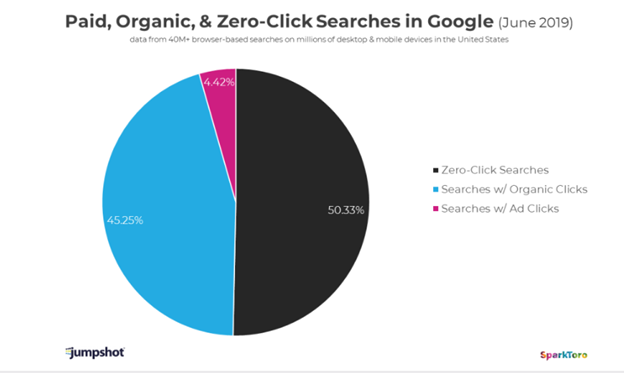
Source – Sparktoro.com
The study also showed that, during a 3-year period (2016-2019), while the CTR of paid ads on Google had been gradually increasing, the Organic search results’ CTR decreased over time.
According to another study, By 2020, “Zero Click Searches” reached almost 65% of total Google searches.
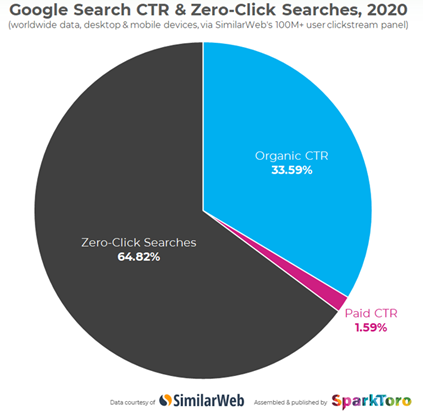
Source – Sparktoro
The above stated numbers address mobile and desktop. When looking only on mobile devices, the situation is even more drastic, with over 77% Zero Click Searches!
So, are the long-standing prophecies coming true? Is SEO dying? Well, the short answer is NO.
In October 2022, a new study by SEMrush was released, arguing that the amount of Zero click google searches is not nearly as high is it has been claimed to be. In fact, the terrifying statistics that have been presented to us in the abovementioned studies are far from being accurate, with merely 17.3% of mobile zero click searches, and 25% of zero click searches conducted via desktop.
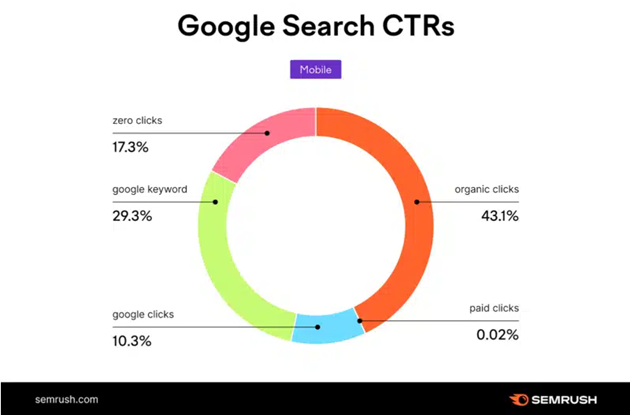
Source – SEMRUSH
In the image above, ‘Google clicks’ refer to an action that changes the URL while keeping the user in Google the almighty (such as switching from the main SERP to shopping / images, clicking a carousel, news, etc.).
The interesting thing to understand here is, that nearly 30% of users will either refine or extend their search, which will be counted as a different type of zero click result.
So what does this all actually mean, and how do zero click searches affect the SEO strategy? To understand Zero Click Searches and their influence on SEO, keep reading.
What are zero click searches?
Zero click searches, also called “no-click searches”, are queries in Google (or any other search engine), that end without a click on the organic search result.
Although the term “Zero Click Searches” might sound a bit misleading, it is important to stress that “zero clicks” refers to clicks to the website presenting the result, not clicks within the SERP itself (like clicks on a phone to make a call, or a click to open the “people also ask” box).
What Causes Zero Click Search results?
When a user types a query into a search engine, we can assume one is looking for a piece of information. So, what makes a user decide to not click on the search result?
1. Getting a Straight-Forward Answer on the SERP
Many new features, such as featured snippets (a short part of the text, answering the query and linking to the rest of the content), direct answer (which, unlike the Featured Snippet, contains facts only, coming from Google’s data source and don’t contain additional links to external, third-party websites), knowledge panels, the People Also Ask (PAA) feature, etc., aim to provide users with answers to their queries in the Google environment, without them having to visit a different website.
For users, this is super beneficial, as they don’t have to wander around various articles, looking for an answer that can be quickly found without all the fuss.
To digital marketers, on the other hand, this brings a whole new challenge of driving users to their websites by providing them with somehing that cannot be provided in the SERP itself.
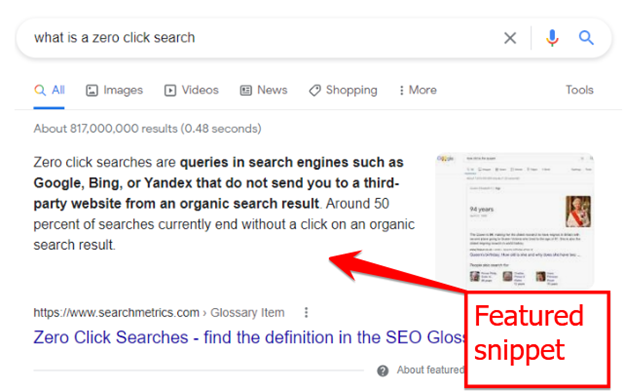
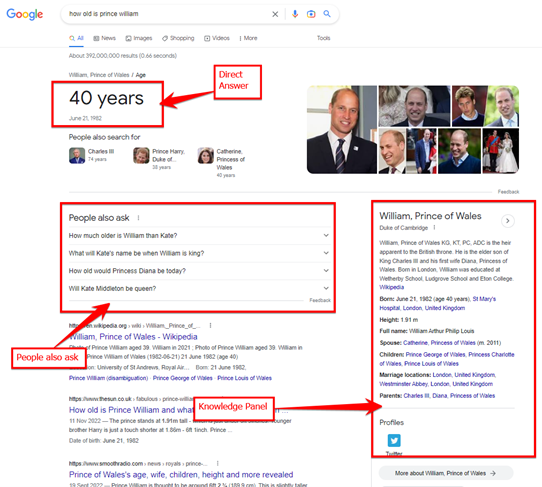
2. Google Prioritizes Its Own ‘Assets’ in the SERP
This results in organic results being pushed down, in many cases beneath the fold.
With Google Ads, Featured videos, Google flights / hotels, Google My Business, and more, sometimes the SERP is so filled up with Google’s assets, that users most likely won’t even have to scroll down to the organic results section, as they can already get their answer from Google itself beforehand.

How can SEO handle Zero click searches?
Google is known for the challenges it presents throughout the years to the SEO community. Here’s a great tweet by @CyrusShepard what pretty much summs it up –
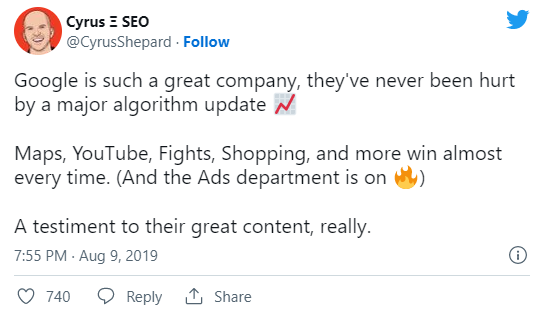
So, What Can SEO Specialists Do to Keep Driving Traffic to Websites?
1. Schema.org
Marking up structured data is one way to make sure we help Google understand what our content is all about. Schema mark ups make content readable to a machine, giving the site a greater chance to appear in the SERP with a clickable feature.
For example, by marking your FAQ section or creating an event schema, one can increase the chances of a website appearing as a rich result, allowing users to continue their interaction with the result by clicking to read more on the topic, or booking a service the website offers.
2. Creativity
This is probably the most important thing when it comes to “competing with Google”.
Be creative, think outside the box and try being one step ahead.
When creating your content strategy, ask yourself the following questions:
- Does Google already have a direct answer to the topic my article is addressing? If so, consider addressing long-tails and answer other questions that can not be answered in a short phrase, and will require additional reading.
- Is my content well structured so that crawlers can read and present it in a way that will drive additional interaction? For example, when answering a question in an FAQ section of an article, it would be a good idea to write the answer in a way that will require the user to click and read the rest of the article to gain a wider, more complete understanding of the subject searched for. It’s also worth optimizing your content for PAA (People Also Ask) by conducting a quality keyword research focusing on longtails.
- Is my content addressing different user intents? Writing comprehensive content, which deals with various user intents and answers different possible types of questions, can assure an evergreen piece of content that will continue providing additional value and driving traffic long term.
How can the impact of Zero click searches be measured?
When analyzing your website’s performance, you have to take into consideration not only the clicks, but also the awareness your brand generates.
One way to look at this is by understanding the correlation between impressions and changes in rank for a specific keyword.
If a query doesn’t deliver much traffic but has an increasing number of impressions, this might indicate a zero click search result; while no traffic is driven to the site from that query, there are other metrics of relevance which are being considered by Google, and might affect the ranking of that query.
Another thing to look at, is the share of voice of your brand compared to competitors. An increasing share of voice might indicate that Zero Click features are driving awareness to your brand, positioning it above competitors in your field.
A word of reassurance: No need to panic
When looking at the statistics presented by different sources of high authority in the fields of SEO and digital marketing, it might seem that SEO is losing its magic and that all resources should be directed towards paid advertising. But the truth is, every piece of research should be examined with high suspicion.
In fact, a high percentage of the Zero Click Searches have logical explanations behind them, like:
- Users not receiving the answer they were looking for in the SERP
- Queries that were not meant to drive traffic to the website in the first place (e.g., users typing a name of the restaurant and clicking the “call” button, or the “direction” button on the Google places result. They had no intention to visit the restaurant’s website, but that doesn’t mean the restaurant will not benefit from that user, right?)
- People typing a query to get help with spelling or looking for the meaning of a word.
When looking at the numbers related to Zero Click Searches on mobile devices, this actually makes a lot of sense, as users use their mobiles to perform direct, straightforward actions to provide for their current needs: finding local business contact info, checking quick facts, typing queries to have them reformulated into a more relevant version by the search engine, etc.
Google continues to improve its experience for the users, presenting the best, most accurate answer to a query, without the user having to visit an external site. Reconsidering the content strategy of a website is something that every website owner should be doing.
Identifying which keywords are more likely to generate clicks to your website versus terms that might give the direct answer on the SERP, is crucial when constructing your content.
Web owners must not aim to avoid Zero Click Search results related to their site, as this is an extremely important part of establishing a site’s authority in specific fields!
The right strategy would be to construct the content in a way that can provide high quality answers to as many questions and longtail queries as possible, while leaving all options open – meaning, answering the question in a way that will make the user click to gain the highly-needed information.
This is done by thorough keyword research, competitor research, and a lot of creativity when trying to understand what extra value can we provide to every single query.
For more professional tips on SEO, ASO, marketing and more, see the yellowHEAD Blog and sign up for the newsletter.
 BACK TO BLOG
NEXT ARTICLE
BACK TO BLOG
NEXT ARTICLE 






